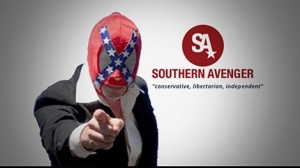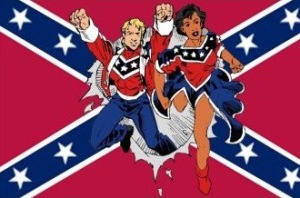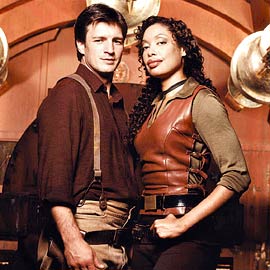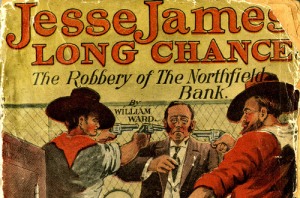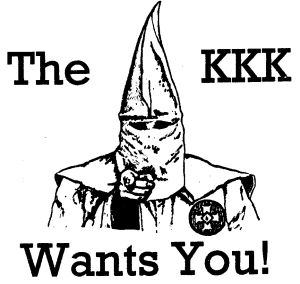A sure sign you’re running for President: firing your racist sidekick.
Last summer Kentucky Senator Rand Paul, by “mutual decision,” accepted the resignation of his aide Jack Hunter, AKA the Southern Avenger. Rand is having trouble climbing out of his father’s Libertarian shadow along with all those shadowy white supremacists the Libertarian brand attracts, so Hunter’s views on Southern succession, the Lincoln assassination, and whether “a non-white majority America would simply cease to be America” were declared a “distraction.”
Hunter also retired the Southern Avenger (he reportedly adopted his radio shock jock persona during a conversation with a bottle of Jim Bean), but not before co-writing Paul’s The Tea Party Goes to Washington. Hunter did not co-write the sequel, Government Bullies, which was an even bigger “distraction” because the Senator plagiarized it instead. That would get him expelled from my college, but the White House has different standards.
I teach at Washington & Lee University, in a smallville known as a War-Between-the-States tourist Mecca, so I’m familiar with all brands of Southern Avengers. The remains of not one but two Confederate generals rest within a half-mile stroll of my front door. Confederate flags are common—though, unlike Mr. Hunter, most folks don’t sport them on superhero-style masks. Even Captain Confederacy (a creation of comic book writer and former Minnesota gubernatorial candidate Will Shetterly) retired his mask when his series moved to Marvel’s Epic back in 1991. The comic was set in an alternate universe in which the Confederacy won the Civil War (apparently the same universe Newt Gingrich visited for his 2005 Gettysburg novel). After Shetterly retired his first Captain, he has a black woman take over the identity, draping Old Dixie across her breasts.
If that sounds implausible, then you didn’t attend my town’s council meeting in which Southern Avengers protested the banning of Confederate flags from city flagpoles. I can’t criticize since I used to wear the same image across the back of concert t-shirts, believing it represented nothing more than a subgenre of rock. I was sixteen and still preferred Lynyrd Skynyrd’s Gimme Back My Bullets over R.E.M.’s Fables of the Reconstruction.
Civil War reenactors, another common spectacle in Lexington, VA, attended the council meeting too. W&L borders the Virginia Military Institute where I watched a legion of gray-clad and hoop-skirted extras cheer a regal Stonewall Jackson while shooting a scene for the 2003 Gods and Generals. W&L declined the film company’s request to shoot on our campus. For Somersby, crews shoveled the historic downtown streets with dirt and angled the Exxon station out of shots. I’ll watch Jodie Foster in anything, but I like Somersby for its time period. Reconstruction is way more interesting than the Civil War.
Marvel movie guru Joss Whedon agrees. He started writing his TV series Firefly after reading Michael Shaara’s The Killer Angels. Whedon also took an undergraduate class from Richard Slotkin, author of Gunfighter Nation, a seminal study in American frontier mythology. Whedon sets his dystopic future six years after a Civil War with a dispossessed Confederate soldier (he sings “We shall rise again” in the premiere) for a space captain. “Mal’s politics,” says Whedon, “are very reactionary and ‘Big government is bad’ and ‘Don’t interfere with my life,’” attitudes Senator Rand and his former sidekick sing about too. But unlike the Tea Party, Whedon sees both sides: “sometimes he’s wrong—because sometimes the Alliance is America, this beautiful shining light of democracy. But sometimes the Alliance is America in Vietnam: we have a lot of petty politics, we are way out of our league and we have no right to control these people. And yet! Sometimes the Alliance is America in Nazi Germany. And Mal can’t see that, because he was a Vietnamese.”
Actually Mal is the very Caucasian Nathan Fillion, but his second in command, like the second Captain Confederacy and at least one of the flag-wearing protesters at the Lexington council meeting, is an African American woman (AKA, Gina Torres). Whedon’s Confederacy never had slavery. Which is why his take on the Reconstruction is both watchable and a complete cop-out. In some ways, I prefer Edgar Rice Burroughs’ dispossessed Confederate soldier, John Carter. He heads West to dig gold and fight Injuns but ends up on Mars instead—where, surprise surprise, he gains superpowers and champions a ruined race of aristocrats against four-armed apes and green heathens. The Princess of Mars gave me allegorical whiplash, but at least Burroughs’ politics aren’t hard to decode. The South is dead, long live the South.
John Carter and Mal Reynolds are both Reconstruction-fueled space cowboys, which makes them descendants of the real life Southern avenger Jesse James. During the war, James fought as a Missouri bushwhacker against local Union militias. After Richmond fell and General Lee surrendered, the pardoned general-in-chief served as president of my university. Jesse James kept fighting. He saw his campaign of train and bank robberies as resistance to Republican-led Reconstruction. After his murder in 1882, dime novelist converted him into a gunslinging Robin Hood. Like the more recent Southern Avenger, James was also a political columnist. Jack Hunter wrote for the Charleston City Paper, where his articles remain online because his editor refused his request to remove them. James wrote his diatribes for the Kansas City Times, where the owner was a fellow vet working to restore ousted successionists to office.
Missouri elected Democrat Senator Francis Cockrell in 1875, who went on to serve five terms before retiring. To the best of my knowledge, Jesse James was never his aide nor helped him plagiarize any books, but the senator was evidence that the Radical Republicans (their term) had lost control of Reconstruction. The era formerly ended in 1877 when President Hayes withdrew the last federal troops. Their departure also marks the end of the South’s most famous team of masked avengers, the Ku Klux Klan. They’d started as a social club of Confederate vets in Pulaski, Tennessee, but grew into paramilitary groups that openly murdered opponents and police.
Like the X-Men, the Klan also wore identical costumes while led by a man codenamed “Cyclops.” The X-Men attract an impressive range of southern mutants, including Rogue, Gambit, Cannonball and the Blob. Technically DC’s Swamp Thing is a Southerner too, since he crawled out of a Louisiana swamp, but he and his superhero kin are no Southern Avengers. Superman first battled the Klan on the radio 1946, and he’s been followed by the Defenders, Black Panther, Batman, and both the Justice League and the Justice Society.
Hell, even the Southern Avenger hates racists now. Hunter blames all those old slurs of his on that pesky mask: “Whenever I put on that wrestling mask, I took on a persona that was intentionally outrageous and provocative. I said many terrible things. I disavow them.” The unmasked Hunter now criticizes fellow Republicans who dismiss “the idea that racism is actually a problem. I used not to see it. For that, I am very sorry.”
That’s more of an apology than the Confederacy ever offered its African American population. I wouldn’t call it superheroic, but if the Southern Avenger can transform himself, maybe there’s hope for the rest of our disunited States too.

